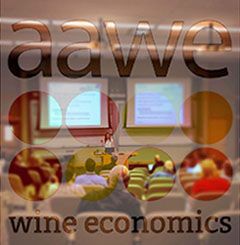Millenials and Sustainability: the Future of Wine

Last June 10 – 14, the 12th American Association of Wine Economists Annual Conference took place in Ithaca NY, USA, hosted by Cornell SC Johnson College of Business & Cornell College of Agriculture and Life Sciences. Some colleagues of mine from the University of Parma and Cornell University have participated at the event and presented some recent studies which we have been working on in the last years.
First, Gnel Gabrielyan, a postdoc from the Cornell University, has presented a working paper titled “An application of the choice-based conjoint analysis to study wine consumers and the role of sustainability communication”, co-authored by me, Cristina Mora and Davide Menozzi.

The work was aiming at understanding better the importance of a new Italian wine sustainable label. Worldwide, to enhance the quality of the wine and its competitiveness, the International Organisation of Vine and Wine considers also as main priorities the management of economic resources and social aspects inside and outside the winery. Nevertheless, also in the Italian wine sector, sustainability is starting to become a key issue and it embraces the aims to protect the environment and landscape, biodiversity and ecosystems, to manage water resources and the challenge of climate change. Our contribution to the current literature on wine preferences was investing whether consumers might be willing to trade off the tradition quality cues of a wine (i.e. denomination of origin) for a sustainable attribute, which is offered to the respondent through the presence of “V.I.V.A. sustainable wine” logo.
Another research of our team from Parma was presented by two young research assistants, Mr. Umberto Massa Saluzzo (in the picture below) and Miss Silvia Turani and titled “Habits, attitudes and credence towards wine. Where and how do Italian millennials’ wine consumers find the information they need?” The aim was to have a better understanding of how young people perceive and evaluate the quality and safety of wine and which attributes most influence their wine choice, consumption and affected risk behaviors.

Finally, also my supervisor at Cornell, Dr. Miguel Gomez (in the picture below) associate professor at the Charles H. Dyson School of Applied Economics and Management, presented an experimental study, co-authored with Jie Li and Kathryn LaTour. The presentation titled “Does taste sensitivity matter in the wine industry? The influence of sensory tasting information and taste sensitivity on purchasing behaviors” suggests that producers and marketers always use product sensory tasting information, a form of marketing communication, to target different segments of consumers with heterogeneous taste preferences. Their results showed how lab experiments, combined with the field experiment, provides evidence that consumers’ innate taste characteristic influences how they process sensory information and evaluate wines.

During the three-day conference, many other researchers and stakeholders from the wine sectors had the chance to presents their recent works and exchange insights about the future of the wine sector. For the full programme and abstracts, please visit http://www.wine-economics.org/
2021 - Giovanni Sogari | Privacy Policy | Cookie Policy